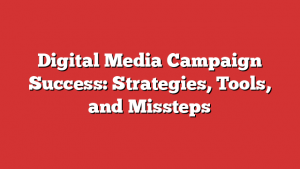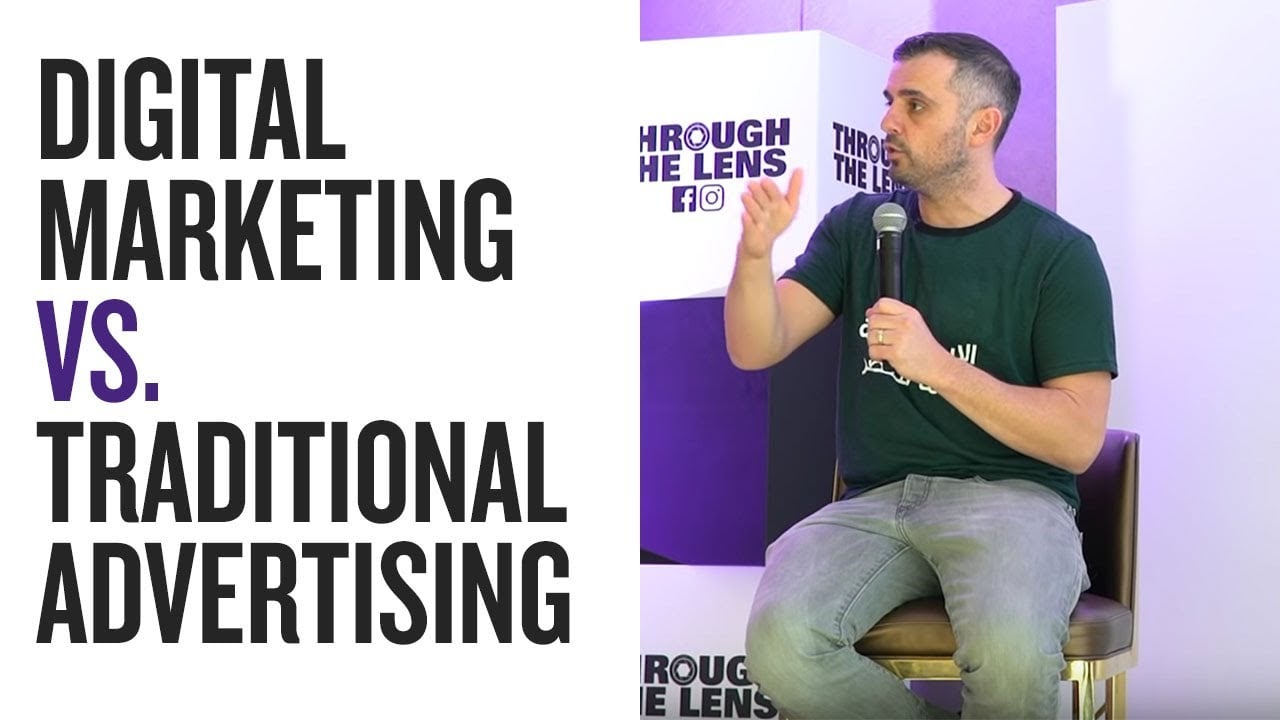Are you ready to unlock the secrets of a successful digital media campaign?
In today’s fast-paced, technology-driven world, brands are turning to various digital marketing methods to skyrocket their success.
From captivating video content to engaging social media campaigns, the possibilities are endless.
Join us as we delve into the exciting realm of digital marketing and discover how big brands are using affordable tactics, creating shareable experiences, and leveraging the power of word-of-mouth to boost their brand advocacy.
From Dove’s groundbreaking #ShowUs campaign to Heineken’s revolutionary “Cheers to All” campaign, the world of digitalmedia is bursting with innovation.
And with Adobe Campaign’s cutting-edge tools, customer relationships and real-time engagement have never been easier.
Let’s dive in and explore the fascinating world of digitalmedia campaigns, where possibilities are limitless and success is just a click away.
| Item | Details |
|---|---|
| Topic | Digital Media Campaign Success: Strategies, Tools, and Missteps |
| Category | Marketing |
| Key takeaway | Are you ready to unlock the secrets of a successful digital media campaign? In today's fast-paced, technology-driven world, brands are turning to various digital marketing methods |
| Last updated | December 30, 2025 |
digital media campaign
A digital media campaign is a marketing strategy that utilizes various digital platforms and tools to promote a brand, increase brand awareness, engage with the target audience, drive conversions, and generate user-generated content.
It involves the use of video content, social media, email marketing, blogs, chatbots, display ads, and other digital marketing methods.
This type of campaign offers several advantages, including scalability, affordability, measurability, and the ability to build omnichannel relationships.
Successful digital media campaigns have been executed by big brands such as Airbnb, UNIQLO, American Express, Dove, Red Bull, Sephora, JetBlue, and Heineken.
It is important to align campaign goals with company goals, understand the consumer, and use customer data responsibly.
Additionally, the integration of artificial intelligence, location-based marketing, mobile device targeting, and human interaction can further enhance the effectiveness of a digital media campaign.
Key Points:
- Digital media campaigns utilize various digital platforms and tools to promote a brand, increase brand awareness, engage with the target audience, drive conversions, and generate user-generated content.
- Video content, social media, email marketing, blogs, chatbots, display ads, and other digital marketing methods are used in digital media campaigns.
- Advantages of digital media campaigns include scalability, affordability, measurability, and the ability to build omnichannel relationships.
- Successful digital media campaigns have been executed by big brands such as Airbnb, UNIQLO, American Express, Dove, Red Bull, Sephora, JetBlue, and Heineken.
- Alignment of campaign goals with company goals, understanding the consumer, and responsible use of customer data are crucial for successful digital media campaigns.
- Integration of artificial intelligence, location-based marketing, mobile device targeting, and human interaction can further enhance the effectiveness of a digital media campaign.
Check this out:
💡 Did You Know?
1. The first digital media campaign took place in 1994 when AT&T launched “You Will” ads to promote the possibilities of future technologies.
2. The most expensive digital media campaign to date was the 2014 Pepsi Refresh Project, with a total cost of $95 million.
3. The shortest digital media campaign ever conducted lasted only 3 minutes and 46 seconds. It was an experimental campaign by a start-up that aimed to create a viral video in the shortest possible time.
4. In 2006, Dove launched a groundbreaking digital media campaign titled “Evolution,” which exposed the excessive use of digital photo editing in beauty advertisements. The campaign’s viral video received over 60 million views within its first year.
5. The first digital media campaign to successfully integrate artificial intelligence and personalization techniques was the 2012 Obama Presidential Campaign. Their team developed advanced algorithms to target specific voters with personalized messages, contributing to their victory.
Video Content In Digital Marketing Campaigns
Video content has become an essential component of digital marketing campaigns in recent years. Its popularity can be attributed to its engaging nature and ability to convey information effectively.
Businesses have leveraged video content on various platforms, including social media, websites, and email campaigns, to capture the attention of their target audience.
When it comes to digital marketing campaigns, video content offers a unique opportunity to showcase products or services in an engaging and memorable way. It allows businesses to tell their story, demonstrate product features, and connect with their audience on an emotional level.
Videos can be used to raise brand awareness and communicate the values and mission of a company.
Furthermore, video content is highly shareable, allowing businesses to extend their reach and generate buzz around their campaigns. Social media platforms such as YouTube and Facebook have proven to be effective channels for sharing video content and reaching a wider audience.
By creating compelling and shareable videos, businesses can increase brand awareness and engagement.
- Video content is essential in digital marketing campaigns
- Videos are engaging and effectively convey information
- Businesses leverage video content on social media, websites, and email campaigns
- Showcase products/services, tell stories, and connect with the audience emotionally
- Videos raise brand awareness and communicate company values
- Video content is highly shareable, extending reach and generating buzz
- YouTube and Facebook are effective channels for sharing video content.
Leveraging Social Media In Campaigns
Social media has revolutionized the way businesses connect with their target audience. It offers a platform for businesses to engage with customers directly and build relationships with them. Social media platforms such as Facebook, Twitter, and Instagram have become essential tools in digital marketing campaigns.
Social media allows businesses to create a two-way conversation with their audience. It enables businesses to share content, receive feedback, and respond to customer inquiries. Through social media, businesses can develop a brand personality and establish a strong online presence. By creating engaging and shareable content, businesses can boost brand awareness and gain new followers.
In addition, social media platforms offer advertising opportunities, allowing businesses to target specific audiences and reach a wider customer base. These platforms provide comprehensive analytics, enabling businesses to measure the success of their campaigns and make data-driven decisions. By leveraging social media in digital marketing campaigns, businesses can achieve higher brand awareness, engagement, and conversion rates.
- Social media revolutionizes the way businesses connect with their audience
- Facebook, Twitter, and Instagram are essential tools in digital marketing campaigns
- Social media allows for a two-way conversation with customers
- Creating engaging and shareable content helps boost brand awareness
- Social media platforms offer advertising opportunities to target specific audiences
- Comprehensive analytics enable businesses to make data-driven decisions
The Power Of Email Marketing
Despite the rise of social media and other digital marketing techniques, email marketing remains a powerful tool for businesses to connect with their audience. Email campaigns offer a personalized and direct approach to engage with customers and drive conversions.
Email marketing allows businesses to segment their audience and send targeted messages based on customer preferences and behaviors. This level of customization ensures that recipients receive relevant content, increasing the likelihood of engagement and conversion. By integrating videos, images, and personalized messages, businesses can create compelling email campaigns that resonate with their audience.
Moreover, email marketing provides an opportunity for businesses to nurture customer relationships and build loyalty. Sending regular newsletters, updates, and exclusive offers keeps customers engaged and reinforces brand identity. It also allows businesses to gather valuable customer data and insights, enabling them to refine their marketing strategies and improve campaign effectiveness.
In conclusion, email marketing remains a powerful tool in digital marketing campaigns. Its personalized nature and ability to drive customer engagement make it an essential component for businesses looking to boost brand awareness and conversions.
FAQ
What is a digital media campaign?
A digital media campaign is a comprehensive and targeted approach to marketing that utilizes various digital channels to engage with consumers and drive business results. With the widespread use of digital devices and platforms, such as social media, websites, mobile apps, and email, companies can reach their target audience effectively and efficiently.
Through a digital media campaign, brands can create and deliver relevant content, advertisements, and promotions to their audience at different touchpoints in order to increase brand awareness, generate leads, and drive conversions. This strategy allows companies to leverage the advantages of digital technology and data analytics to track and measure the effectiveness of their marketing efforts, enabling them to optimize their campaigns for maximum impact and return on investment.
What is an example of a digital marketing campaign?
Another example of a digital marketing campaign is Coca-Cola’s “Share a Coke” campaign. This campaign personalized their product by replacing the Coca-Cola logo on their bottles with popular names and encouraging people to share a Coke with someone they know. Through targeted social media advertising and influencer partnerships, Coca-Cola successfully engaged with consumers and created a buzz around their brand. The campaign not only drove sales but also generated user-generated content as people shared pictures and stories of themselves with their personalized bottle of Coke.
What is a campaign in media?
A media campaign refers to a strategic effort that employs various media platforms to persuade individuals to adopt a desired behavior or belief. This can be achieved through a range of media options, including advertisements, newspaper or magazine articles, and digital banners. By utilizing these mediums, the campaign aims to captivate and engage the target audience, influencing their thoughts, attitudes, and ultimately, their actions. Whether it’s promoting a new product, raising awareness about an issue, or advocating for social change, a media campaign is a powerful tool to effectively reach and communicate with a mass audience.
What are the 3 types of digital media?
Earned media, owned media, and paid media are three distinct types of digital media with varying characteristics and applications. Earned media refers to the organic exposure gained through positive word-of-mouth, social media shares, or press coverage, which can boost a brand’s reputation and visibility without direct financial investment. Owned media, on the other hand, is content and channels that a brand has complete control over, such as its website, blog, or social media platforms. This allows businesses to have a direct relationship with their audience and tailor their messaging according to their goals. Lastly, paid media involves advertising or sponsored content that a brand pays for to reach a wider audience, such as display ads, promoted posts, or influencer partnerships. This type of digital media can be highly targeted and is useful for increasing brand awareness or driving conversions. Understanding the characteristics and strategic implications of each type is vital for businesses to develop a comprehensive digital marketing strategy tailored to their specific goals and target audience.
New optimization tactics included — stay ahead.











